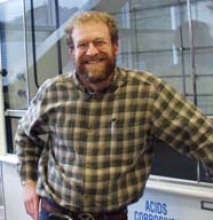ChEMS Seminar: New Nanomaterials at the Interface of Structural Biology and Polymer Science

Facility Director, Biological Nanostructures
Lawrence Berkeley National Laboratory, Berkeley, CA
Abstract: Recent advances in solid-phase organic synthesis are dramatically shrinking the materials gap between biopolymers and traditional polymers. It is now possible to synthesize protein-sized synthetic polymers with exact control over main chain length and monomer sequence to create a new class of information-rich materials. Peptoids are a particularly promising bio-inspired polymer platform because of their highly efficient synthesis and ready availability of starting materials. Hundreds of chemically diverse side chains can be introduced from simple building blocks, allowing properties to be finely tuned. The peptoid platform allows the systematic investigation of new materials that are intermediate between proteins and bulk polymers, in both their structure and their properties. But which peptoid sequences will fold into unique and productive protein-like structures? Some of the answers come from nature's design rules, revealed by the field of structural biology. Here we describe a family of peptoid sequences that fold into well-defined nanosheets that can display surface loops capable of specific molecular recognition. Such materials may become the basis for robust sensors for chem/bio detection.
Bio: Ronald Zuckermann received his bachelor's degree in chemistry in 1984 from Harvey Mudd College where he did undergraduate research in synthetic organic chemistry. He then went on to UC Berkeley to study bioorganic chemistry with Dr. Peter Schultz. His thesis work was on the synthesis of semi-synthetic nucleases capable of the sequence-specific cleavage of RNA. After receiving the first Schultz group doctorate in 1989, he became one of the founding chemists at Protos Corp., a combinatorial drug discovery start-up in Emeryville, CA. There he helped develop several key drug discovery technologies such as robotic combinatorial library synthesizers, affinity selection methods and a novel class of heteropolymers called "peptoids." Chiron Corp. acquired Protos in 1991 where this work continued and was applied to small molecule drug discovery, new biomaterials and DNA delivery. Zuckermann was promoted to research fellow in 2003. In early 2006, he left Chiron to join the Lawrence Berkeley National Laboratory, where he is currently facility director of the Biological Nanostructures Facility at The Molecular Foundry. There, he is expanding the application of peptoid polymers to mimic the structure and function of proteins, by folding peptoid chains into defined nanoarchitectures. He was promoted to senior scientist in 2011. He has published over 120 papers and is co-inventor on 38 patents. http://www.ronznet.com
Host: Allon Hochbaum
Share
Upcoming Events
-
MAE 298 SEMINAR: Biomechanics of Rotator Cuff
-
CBE 298 Seminar: Micro- and Nanofluidic Systems for Molecular Biosensing, Nanotoxicity, and Optogenetics
-
MSE Special Seminar: Architecting 3D Complex Materials for Sustainability
-
MSE Special Seminar: Decarbonizing Industries for a Climate-resilient Future - From Renewable Energy to Sustainable Material Recovery
-
CEE Seminar: BIM and the Digital Twin
